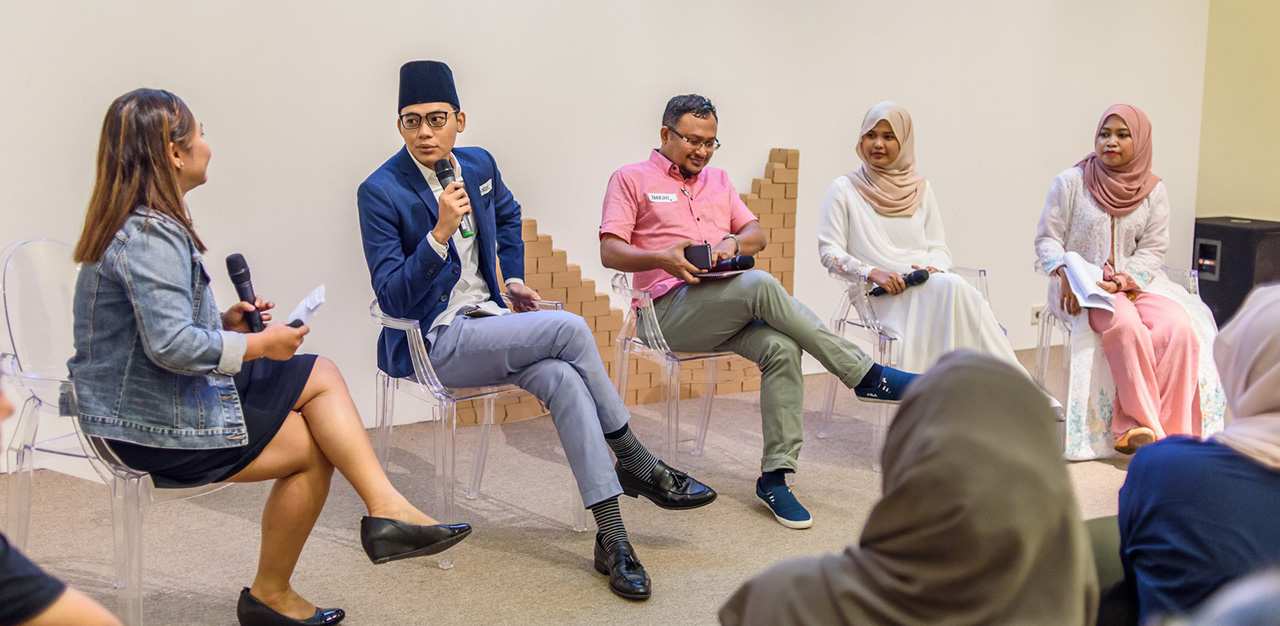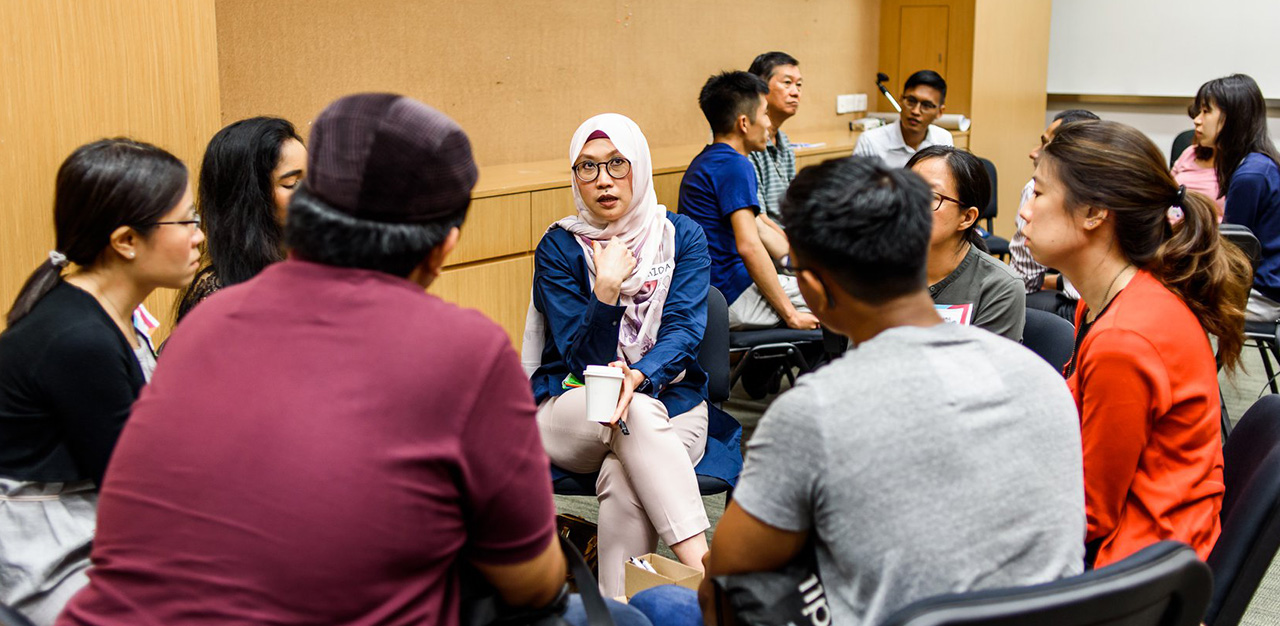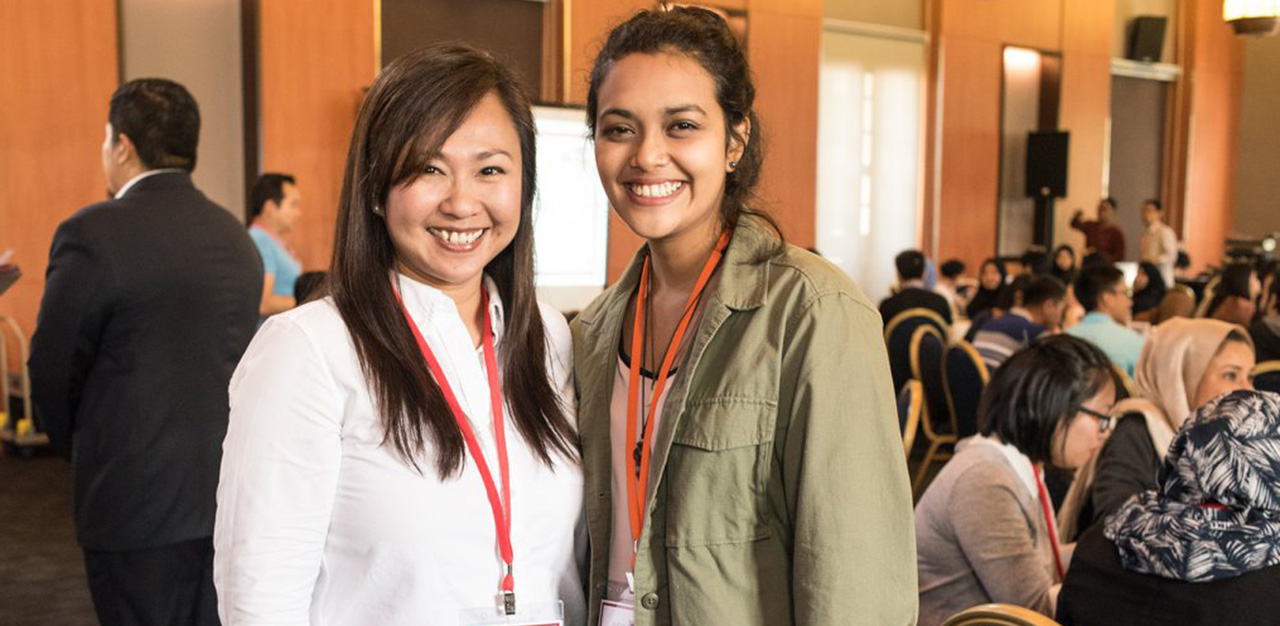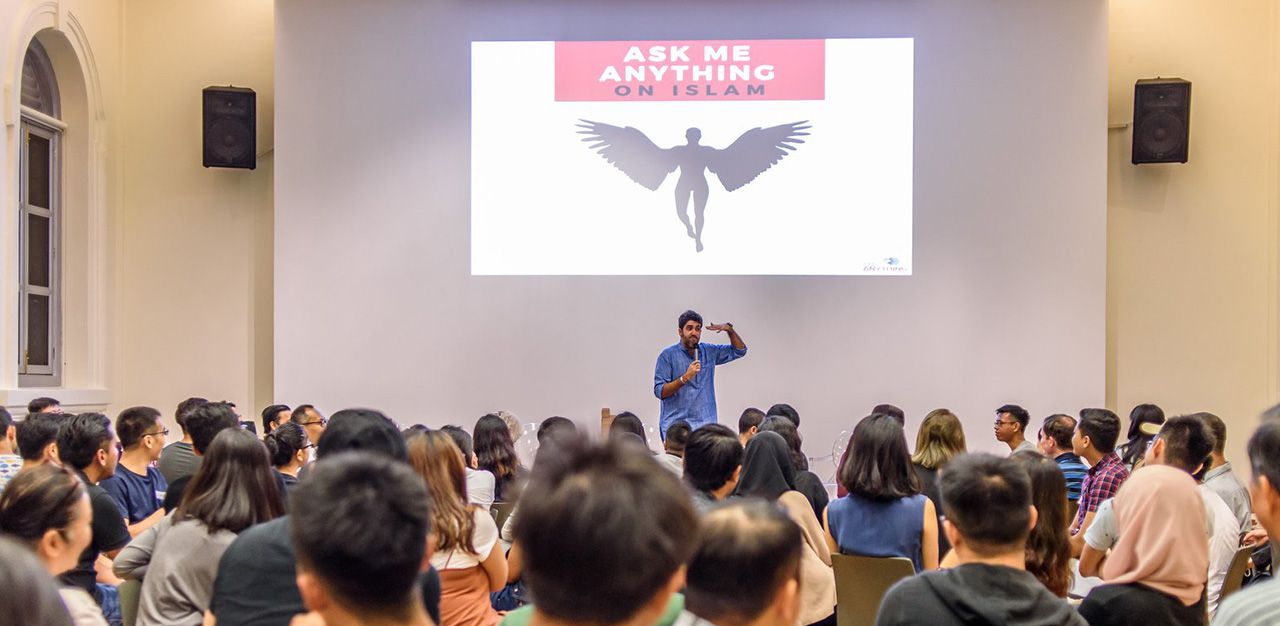By the end of August, Muslim women working in nursing in Singapore’s public sector will find out whether they will be able to wear the tudung with their uniform if they choose. This latest turn of events was revealed by Prime Minister Lee Hsien Loong on 10 April.
In TheHomeGround Asia’s fourth interview on this topic, we ask Shahrany Hassan, community leader and Founder of NGO The WhiteHatters, for her response to the latest developments on this decade-long debate.
At the core of it, Shahrany Hassan is a connector. The mother of two teenagers is passionate about facilitating conversations in the community, particularly around “invisible issues” that are either not talked about openly, or not tackled with sufficient honesty, in Singapore.
Her time working with the State Courts and the Law Society shaped her passion for creating spaces where information can be made freely available and exchanged between different groups within Singapore, that might share cultural, social and economic similarities or disparities.
Ms Shahrany’s contributions to building social cohesion in multicultural and multireligious Singapore have led her to initiate several projects, including interfaith initiatives like Ask Me Anything, an effort to promote “meaningful and authentic exchanges among people of various faiths” to deepen understanding and engage on sensitive social issues. Among the many topics around religion that has been discussed, the hijab or tudung was one of them.

Through social non-profit The Whitehatters, which she co-founded, Ms Shahrany has also worked towards fostering greater understanding and integration between locals and foreigners living in the city state. Besides tackling xenophobia, The Whitehatters aims to create “safe spaces for people to see each other as humans first.”
A Muslim, Ms Shahrany does not wear the religious headscarf, because she says she is not ready: “For me, the decision is personal… Will I ever be ready? I’m not sure. And although a lot of people say it’s not a matter of whether you’re ready, or not, for me it’s important to be ready. Thankfully, my parents are understanding enough. And also, for me, my relationship with God is of more importance to me. It’s important that I am clean… as in my heart is pure before I put it on. When it comes to faith, everyone is on their own journey.”
When talking about the policy that prevents Muslim women in Singapore from wearing the hijab in public sector uniformed jobs, such as nursing, the police force and armed forces, Ms Shahrany says that she does not understand why the issue has come to this.
“How is wearing the hijab going to restrict their [nurses] movements, or their level of care that they provide?” she asks. “But I understand that policymakers are probably not just thinking about the nursing profession, and not just here and now, but they’re thinking about other sectors and the thereafter. So there are probably other considerations that they have to weigh in, that we are not privy to.”
The ‘ban’ on nurses wearing the hijab in the workplace might soon be lifted. On 10 April, Singapore Prime Minister Lee Hsien Loong said that the Government should prepare to allow Muslim nurses to wear the tudung when in uniform. Ms Shahrany says that she is “glad’’ Mr Lee made the statement and that it was a “long time coming”. But notes that it is a decision that needs to be “weighed and not rushed”.
She adds, “It goes to show that the Government, like society, is evolving. We cannot and should not remain static. That said, we also need to be more mindful of the sensitivities by the different communities in Singapore as everyone has a stake here. Whatever the decision, it won’t please everyone. We will then need to make the necessary concessions.”
Here are some more of Ms Shahrany’s thoughts around various aspects of the tudung issue:
(Note: The interview below was conducted before Mr Lee’s announcement on 10 April and has been edited for clarity and length.)

On the tudung ‘ban’ being an issue of maintaining secularism and neutrality
Shahrany: I don’t know whether it’s an issue of secularism. Just look at our schools itself. My daughter attends a convent school, I have no issue with it. And they excuse the non-Christians when they have mass, so the non-Christians would go to another room, and they would hang out. My son was also in a Methodist school. Same thing. Being in a faith-based school need not necessarily affect one’s faith. But if you’re talking about secularism, then we shouldn’t even have that in schools, right. And we shouldn’t even have symbols of faith in all government sectors.
I think the crux of the matter is that the public, particularly the Muslim community, is trying to understand, why is it that you don’t allow the hijab in a uniform service, when you’re not changing the uniform but just modifying it. If we can allow it in the private sector, why not in the Government sector? I think the hardest thing is changing mindsets.
On why this should not only be a Malay/Muslim issue but should engage the nation
Shahrany: The public is a bit peeved because we have not had public discourse on this, except for the one I had in 2017. Out of 40 participants [at the event organised by Ask Me Anything], I think more than 30 attendees were non-Muslims. And they were very vested in the conversation because they wanted to better understand why wearing the hijab is important to some women, even at the workplace. And for us as organisers, it was very important for us to show the diversity of Muslim women – women who wear the tudung and those who don’t. And I think this open, public, respectful conversation is what is needed. We need to be more consultative, to hear from all parties; invite them in a safe space to discuss this openly so that various groups within the community can hear what others have to say, whether or not their views have changed at the end of the conversation, that’s secondary.
What’s important is that each person gets to hear what the other person is saying and where they are coming from. It is through this two-way or multi-way dialogue that we can better understand each other. And learn from one another… You must be comfortable enough to ask questions relating to the faith. And it should start from home.
I think that’s what it’s all about being in a secular state. It’s not just the level of tolerance, but really of acceptance. We should go beyond tolerance, tolerance is really superficial.
We’ve never really engaged each other in an honest conversation. I think that’s what’s lacking. And I think because of that, we have such vitriol online.

On potential repercussions if the ‘ban’ is lifted
Shahrany: There will probably be a lot of noise in the beginning. But eventually people will learn to accept it, like everything else. Singaporeans are very good at that, acceptance, because there is generally a high level of trust in the Government and systems. Also, as long as the ban doesn’t affect one directly, we tend to accept it and go about our lives. On the flipside, there will also be groups of people who remain vigilant and wary – to see what will happen next. After the ban is lifted for the nurses, who else will… and when that happens, similarly, there will be a pushback.
On taking this issue of wearing the tudung forward
Shahrany: To appease the wider community we need to have conversations on this, in-person conversations, maybe Zoom or online if that is not possible. We need a civil public discourse but I don’t think we’re ready to debate this issue, or any sensitive issue, respectfully in public yet. We need to start having these discourses. We need to hear all sides, whether or not we agree to it. And it shouldn’t be behind closed doors, maybe in the initial stages, but now since everything is out in the open we need to make a concerted effort to have such conversations so those people who matter get to make [their views heard in] public.
On what the tudung issue reveals about the fragility of Singapore’s multicultural society
Shahrany: That we do have fault lines that we have not sufficiently addressed. For my NGO, we look to address issues that affect social cohesion, interfaith, inclusivity. And we are of the position that there are deepening social fault lines that would make it difficult for us to come together as a nation to withstand a crisis linked to one’s race and faith.
Having been in the interfaith sector and organised many dialogue sessions that are sensitive in nature, one of the things that I wish we could do better is that our religious leaders, not just for photo opportunities, but people who are doing the actual work on the ground, to be able to know one another, so that in the event of a crisis we can easily call each other up and say ‘Hey I need your help in this’, and that person will rally their own followers and groups or community to stand with the other. That’s what we’re lacking and until we reach that stage, those social fault lines will continue to deepen.
On why these fault lines exist in the first place
Shahrany: We have such a diverse nation with different communities. Naturally, we tend to be protective of our communities and stay within that community – we don’t overstep the boundaries. We keep things to ourselves for fear of offending others.
Anything to do with race, religion and nationality or nationalism is always going to be sensitive. When the economy is good nationalism is not an issue. Xenophobia is not much of an issue. But when the economy tanks, when people are fighting for jobs that’s when Singaporeans come first. When it comes to bread and butter issues we want to protect our own first. It’s understandable. And race and religion have always been very very sensitive so the Government takes it very seriously and it’s something that we as a community need to constantly work on, and a lot of the work is invisible. A lot of work is done to assuage the fractures in the social safety net or social cohesion.
On other important issues that affect Malay/Muslim women
Shahrany: There are so many, and not just within the Muslim community, but community in general. I think education, poverty, domestic violence, misogynistic views… these are the issues that we should be concerned with. It’s about advancing ourselves, advancing our families and helping those who really need that helping hand.
Particularly the issue [of domestic violence], because I sit on the board of a crisis shelter, and I’ve run national campaigns on this [on domestic violence and sexual abuse]. It is something that I feel very strongly for. And for the love of God, why are we seeing more reports on sexual abuse, child sexual abuse lately. That’s something that we should be concerned about to make sure that we prevent it from happening. It must be a concerted effort.

On what values she wants to pass on to her children
Shahrany: I always tell them that religion is very personal, your relationship with God is very personal, that whatever happens, whatever you do, it is a direct reflection of your relationship with God. And there’s no point for you to pretend to be good when you are not. What’s important is your sincere thoughts and action, and always try to help others. I always tell my kids, ‘Be kind, be honest.’
On what sort of society we want to build
Shahrany: [A] secular and inclusive [one]. But with influences coming from elsewhere, that need for inclusivity needs to be worked on even harder. Because when it comes to issues of faith, with external influences, there is that off chance that instead of becoming inclusive, you become exclusive, and we are seeing it happen in the different faiths. So that is quite a worrying trend.
For example, for Muslims as they go deeper into their faith, there is also that concern there’s going to be polarisation in the views. It’s about extremist views creeping into Singapore’s community. You had that young boy arrested for planning to bomb a place of worship. So what can we do? We need public awareness campaigns.
But I understand the sensitivity in having awareness campaigns, because then you’ll be targeting certain faiths. It used to be that terrorism is synonymous with Islam and terrorists with Muslims when in fact, terror attacks have been committed by believers of other faiths as well. And now because of this latest incident, or rather, the second latest incident it is then Christians are also terrorists, and now back to Muslims are terrorists against the Jews. So we need a public awareness campaign, to educate the public on how their family members or friends may unwittingly and unknowingly be exposed to such influences and know what the tell-tale signs are. [But] it’s also kind of hard to push that campaign out. But we need to try. We cannot stop trying to make things better for everyone. And it starts with a conversation.
Read our earlier interviews on the tudung ‘ban’ with Nur and Ann of Lepak Conversations, Noor Hanisah of Social Greens and Nazath Faheema.
Join the conversations on THG’s Facebook and Instagram, and get the latest updates via Telegram.














